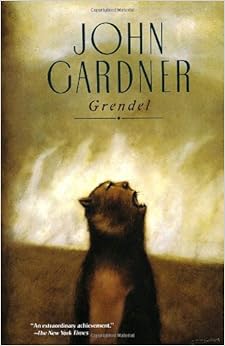Something about epics like Beowulf doesn't seem coherent in the modern world. We're no longer able to take our heroes without a grain of salt, and we're often more amenable to sympathize with our villains. Think of every "We're not so different, you and I" speech given by a comic book bad guy, or the way that science fiction moves like to conclude with some variation of the idea that we were the monster all along. In a way, Grendel is the version of Beowulf we want and deserve, one that looks through the eyes of the monster.
Gardner's Grendel is a vicious monster, but a self-aware one. He has no interaction with anyone but his mute, inscrutable mother, and his brief interactions with humans emphasize his monstrousness. He tells the reader that he is neither "proud nor ashamed" of being what he is, yet he calls himself a "[p]ointless, ridiculous monster crouched in the shadows, stinking of dead men, murdered children, martyred cows." His isolation makes him an ideal observer: from the forest he watches King Hrothgar consolidate his power through violence and hollow ideas of honor and loyalty. He sees the way the singer-storyteller of Hrothgar's meadhall fashions the truth into a kind of useful falsity:
What was he? The man had changed the world, had torn up the past by its thick, gnarled roots and had transmuted it, and they, who knew the truth, remembered it his way--and so did I.
Beowulf tells us that Grendel's persecution of Hrothgar is predicate on his envy at hearing the songs of glory that are sung in the meadhall. Grendel is true to that point, but the songs become a stand-in for a host of human creative activity: literature, religion, science. Grendel, on the other hand, is an embodiment of Sartrean existentialism, a figure of complete nihilism intent on wrecking the pretensions of human civilization. Gardner invents a scene in which Grendel--at the bottom of his cavern, or perhaps in a dream--is coached in existentialism by the rapacious dragon that makes up Beowulf's final episode. These ideas aren't easy or comfortable for Grendel, but they manage to give him a sense of purpose in purposelessness, a kind of meaning predicated on meaninglessness.
All order, I've come to understand, is theoretical, unreal--a harmless, sensible, smiling mask men slide between the two great, dark realities, the self and the world--two snake-pits. The watchful mind lies, cunning and swift, about the dark blood's lust, lies and lies and lies until, weary of talk, the watchman sleeps. Then sudden and swift the enemy strikes from nowhere, the cavernous heart. Violence is truth, as the crazy old peasant told Hrothulf. But the old fool only half grasped what he said. He had never conversed with a dragon. And the stranger?
"The stranger" is Beowulf, who doesn't appear until the novel's very end. Beowulf kills Grendel, as in the epic, by severing his arm, something which Grendel chalks up to mere accident. But as he has Grendel pinned, he forces him to sing a song about the very wall he's shoved against. Is it an indicator of the limits of Grendel's philosophy? Or does it merely suggest that in the end, the "brute existent" of death and nothingness make civilization the only recourse? What's cool about Grendel is that it takes one of the very oldest English texts and turns it into something very modern, which resonates with the philosophical problems that plagued the 20th century.


No comments:
Post a Comment